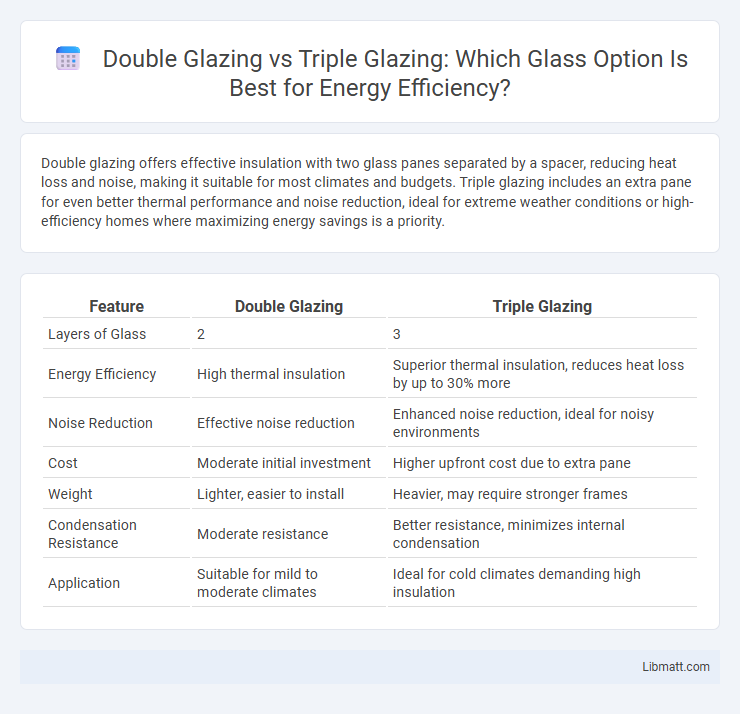Double glazing offers effective insulation with two glass panes separated by a spacer, reducing heat loss and noise, making it suitable for most climates and budgets. Triple glazing includes an extra pane for even better thermal performance and noise reduction, ideal for extreme weather conditions or high-efficiency homes where maximizing energy savings is a priority.
Table of Comparison
| Feature | Double Glazing | Triple Glazing |
|---|---|---|
| Layers of Glass | 2 | 3 |
| Energy Efficiency | High thermal insulation | Superior thermal insulation, reduces heat loss by up to 30% more |
| Noise Reduction | Effective noise reduction | Enhanced noise reduction, ideal for noisy environments |
| Cost | Moderate initial investment | Higher upfront cost due to extra pane |
| Weight | Lighter, easier to install | Heavier, may require stronger frames |
| Condensation Resistance | Moderate resistance | Better resistance, minimizes internal condensation |
| Application | Suitable for mild to moderate climates | Ideal for cold climates demanding high insulation |
Introduction to Double Glazing vs Triple Glazing
Double glazing consists of two glass panes separated by a spacer filled with air or inert gas, providing effective insulation and noise reduction for your home. Triple glazing adds a third pane, enhancing thermal performance and energy efficiency, especially in colder climates or energy-conscious buildings. Choosing between double and triple glazing depends on your insulation needs, budget, and local weather conditions.
How Double and Triple Glazing Work
Double glazing consists of two glass panes separated by a spacer filled with air or inert gas, creating an insulating barrier that reduces heat transfer and enhances energy efficiency. Triple glazing adds a third pane and an additional gas-filled chamber, significantly improving thermal insulation and soundproofing compared to double glazing. Understanding how these layers trap air and minimize heat loss helps you choose the best window solution for your home's comfort and energy savings.
Energy Efficiency Comparison
Double glazing typically provides significant energy savings by reducing heat transfer through windows, with U-values around 1.2 to 1.6 W/m2K, while triple glazing can offer even better insulation, achieving U-values as low as 0.6 to 0.8 W/m2K. The enhanced thermal performance of triple glazing minimizes heat loss more effectively, leading to lower heating and cooling costs, especially in colder climates or energy-efficient buildings. However, the incremental energy savings of triple glazing over double glazing may vary depending on factors such as climate, window frame quality, and overall building design.
Insulation and Thermal Performance
Double glazing typically provides effective insulation by reducing heat loss through two panes of glass separated by an air or gas-filled gap, enhancing your home's energy efficiency. Triple glazing incorporates an additional pane and insulating layer, delivering superior thermal performance and greater resistance to heat transfer, making it ideal for colder climates. Investing in triple glazing can significantly lower your heating costs and improve indoor comfort compared to double glazing.
Noise Reduction Capabilities
Triple glazing offers superior noise reduction capabilities compared to double glazing due to its additional glass pane and wider air gaps, which enhance sound insulation. Sound Transmission Class (STC) ratings typically increase with triple glazing, reducing external noise more effectively in urban and high-traffic environments. Improved acoustic performance from triple glazing contributes to quieter indoor spaces, beneficial for bedrooms, offices, and homes near busy roads or airports.
Cost Differences and ROI
Double glazing typically costs less upfront than triple glazing, making it a more budget-friendly option for initial installation. However, triple glazing offers better thermal insulation, leading to greater energy savings and potentially higher long-term ROI through reduced heating and cooling costs. You should weigh the higher initial investment against expected energy efficiency improvements to determine the most cost-effective solution for your property.
Durability and Longevity
Triple glazing offers enhanced durability and longevity compared to double glazing due to its additional pane of glass and improved spacer technology, reducing the risk of seal failure and glass breakage. The extra layer in triple glazing provides better resistance to environmental stressors such as wind, moisture, and temperature fluctuations, which extends the lifespan of the window unit. High-quality triple glazed windows can maintain their insulating properties and structural integrity for 30 to 40 years, surpassing the typical 20 to 25 years expected from double glazed units.
Environmental Impact
Double glazing significantly reduces heat loss and energy consumption compared to single glazing, lowering carbon emissions in residential buildings. Triple glazing offers enhanced insulation by adding a third pane, further reducing the need for heating and cooling, thus minimizing environmental impact. However, the production and disposal of triple glazing materials can increase resource use and waste, requiring careful lifecycle analysis to optimize sustainability benefits.
Best Applications for Each Glazing Type
Double glazing is ideal for moderate climates where energy efficiency and noise reduction are important but extreme insulation is not necessary. Triple glazing offers superior thermal performance and is best suited for colder regions or buildings seeking maximum energy savings and enhanced soundproofing. Both glazing types improve window insulation, but triple glazing excels in reducing heat loss and improving comfort in harsher environments.
Making the Right Choice for Your Home
Double glazing offers effective insulation and noise reduction by using two panes of glass with a gas-filled gap, ideal for moderate climates and tighter budgets. Triple glazing incorporates an extra pane and additional gas layers, significantly enhancing thermal efficiency and soundproofing, making it suitable for colder regions or energy-conscious homeowners. Your decision should weigh factors like climate, energy savings, upfront costs, and long-term comfort to select the glazing that best suits your home's insulation needs.
double glazing vs triple glazing Infographic

 libmatt.com
libmatt.com